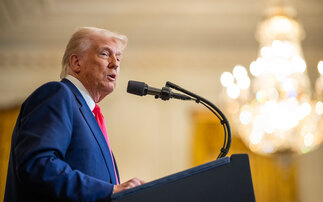Clutching at straws does not do it justice. When the threat to everything environmentalists hold dear is so daunting, casting around for shards of optimism feels futile and indulgent. But what if those shards are in fact giant, shifting tectonic plates, underlying an historic trend that no man, no matter how great their ego, can resist?
There is no way to spin this. Donald Trump is a unique and potentially catastrophic threat to the global environment, the green economy, and efforts to tackle escalating climate risks. He is a far bigger danger than George W Bush ever was and ever could be. This election is akin to putting someone with the climate sceptic, polluting policies of Tony Abbott in charge of the most powerful nation on Earth - it can only end badly.
Trump may make some conciliatory noises in the coming days, but he will appoint climate sceptics to key environmental and energy roles, he will scrap many of Obama's green policies and executive orders, and he will try to unleash a new wave of investment in the coal infrastructure that could on its own condemn the planet to more than 2C of warming this century. The angry coalition of voters and the fossil fuel donors who helped whip them into a frenzy will not countenance anything less. These are dark days.
And yet while this election is a repudiation of pretty much everything environmentalists and green business leaders hold dear, there are reasons to hope this crisis will not turn into a catastrophe.
First, and I'll admit this is highly unlikely, Trump may surprise us. When commenting on Trump's climate scepticism President Obama once warned that reality has a habit of hitting you on the nose. Trump has promised to deliver clean air and water and better environmental protections - he needs to be held to that. He has also promised to deliver a vast array of new infrastructure and by default much essential infrastructure now is low carbon. Trump will be good for polluting industries, but that does not necessarily mean he will be disastrous for green industries.
Moreover, even if he wants to unleash a bonanza for pollutocrats many of America's most powerful states remain fully committed to decarbonisation and green investment, having been completely won over by the economic and health benefits of clean technology.
Then there's Congress. The Republicans might have majorities in the House and Senate, but they lack the supermajority needed to stop filibusters. If the Democrats take one lesson from the last four years it could be that there is no political penalty for partisan obstruction at each and every turn. It will be fascinating to see if a bruised and bewildered American left has the nerve to hold the line in defence of the environment.
But most of all there are the global trends that senior Chinese officials rightly predicted President Trump will struggle to block.
If Trump makes good on his threat to exit the Paris Agreement it will embolden the handful of countries whose commitment to decarbonisation has long been sketchy (we're looking at you Australia, you too Russia). Some key economies will no doubt water down their own climate efforts.
But many more will hold the line. They will see the huge competitive economic opportunity that will only be bolstered if the US hampers its own clean tech sector. They will still recognise that their populations demand clean air and water and a stable climate. They will seek to harness the rapid cost reduction of clean energy.
China is not about to water down its climate plan, India will continue to invest billions in solar power, the EU will stick with its own emissions targets. The UK chose today to unveil plans for fresh investment in renewables and a phase out of coal power within a decade.
Meanwhile, the many multinational firms that are now genuinely committed to building a low carbon economy will not waver either. Walmart will not tear up the science-based emissions targets it has just enacted because Trump is about to cover the Oval Office in gold leaf. Tesla's pursuit of clean power and transport remains as ambitiously single-minded as ever. The myriad of companies looking to cut emissions and reduce the environmental footprint of their supply chains on the grounds it is good for the bottom line and their reputation will not let science-denying Republican blowhards derail them.
Decarbonisation and climate action is no longer about pursuing a greener development path, it is about pursuing a better development path. And even if Donald Trump does not know that it is stupid to turn your back on a good deal, most other countries do.
Of course, this is still clutching at straws. Having Trump's racist, lying, tiny fingers near the nuclear button at a time of immense geopolitical tension could yet make all these worries moot (and that is not an unreasonable fear given he has repeatedly demonstrated that he does not know how mutually assured destruction works). Even if the worst is avoided four years of Trump and his Republian enablers could push the world further past the 2C trajectory that is the only hope for many states and ecosystems. Today it is hard not to fear a depressingly dark era is unfolding. But within the darkness the shards of optimism do remain, and they are more resilient than you think.









